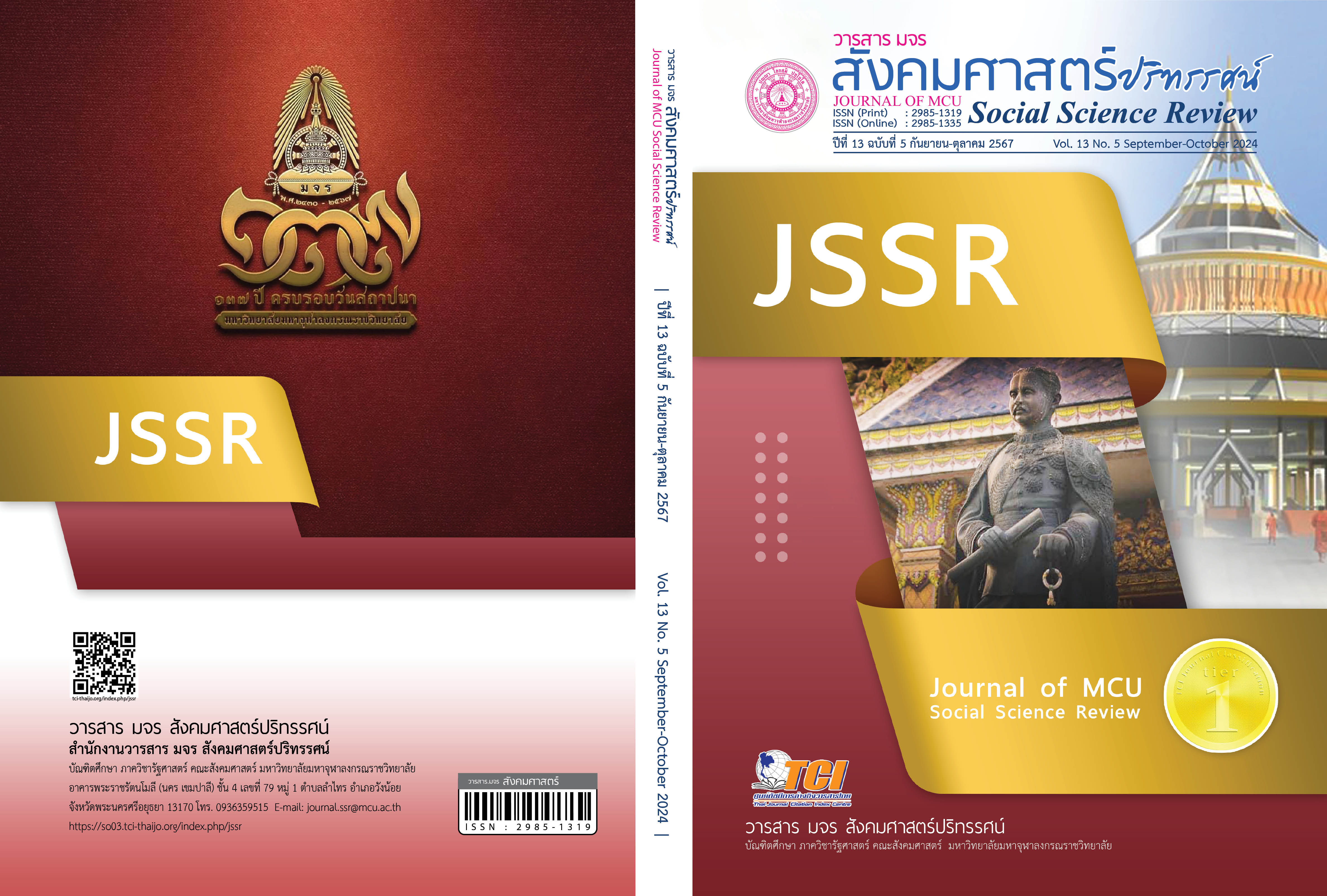ความฉลาดทางดิจิทัลของครูโรงเรียนสามเสนวิทยาลัย สังกัดสำนักงานเขตพื้นที่การศึกษามัธยมศึกษากรุงเทพมหานคร เขต 1
คำสำคัญ:
ความฉลาดทางดิจิทัล, ครูมัธยมศึกษา, โรงเรียนสามเสนวิทยาลัยบทคัดย่อ
บทความวิจัยนี้มีวัตถุประสงค์ 1. ศึกษาระดับความฉลาดทางดิจิทัลของครูโรงเรียนสามเสนวิทยาลัย และ 2. เปรียบเทียบความฉลาดทางดิจิทัลโดยจำแนกตาม เพศ เจเนอร์เรชั่นวุฒิการศึกษา และกลุ่มสาระการเรียนรู้ เป็นการวิจัยเชิงปริมาณ กลุ่มตัวอย่างเป็นครูโรงเรียนสามเสนวิทยาลัย ปีการศึกษา 2565 จำนวน 106 คน กำหนดขนาดกลุ่มตัวอย่างโดยใช้ตาราง Krejcie & Morgan สุ่มแบบแบ่งชั้นภูมิ โดยใช้กลุ่มสาระการเรียนรู้เป็นตัวแบ่งชั้น สถิติที่ใช้ในการวิเคราะห์ข้อมูล ได้แก่ ค่าความถี่ ค่าร้อยละ ค่าเฉลี่ย ค่าส่วนเบี่ยงเบนมาตรฐาน สถิติทดสอบทีแบบอิสระ และสถิติทดสอบความแปรปรวนทางเดียว
ผลการวิจัยพบว่า ระดับความฉลาดทางดิจิทัลของครูโรงเรียนสามเสนวิทยาลัยในภาพรวมอยู่ในระดับมาก ทักษะที่มีค่าเฉลี่ยสูงสุดเป็นลำดับแรก คือทักษะการใช้เทคโนโลยีอย่างมีจริยธรรม เพศหญิงมีระดับความฉลาดทางดิจิทัลในทักษะการรักษาอัตลักษณ์ที่ดีของตัวเองสูงกว่าเพศชายอย่างมีนัยสำคัญทางสถิติที่ระดับ .05 และเจเนอร์เรชั่น Baby Boomer มีระดับความฉลาดทางดิจิทัลในทักษะการรักษาอัตลักษณ์ที่ดีของตัวเองสูงกว่าเจเนอเรชั่น X อย่างมีนัยสำคัญทางสถิติที่ระดับ .05
เอกสารอ้างอิง
ฉัตรพงศ์ ชูแสงนิล. (2562). ความฉลาดทางดิจิทัล (Digital Intelligence). สืบค้น 12 ตุลาคม 2565, จาก https://www.scimath.org/article-technology/item/10611-digital-intelligence
นิตยา นาคอินทร์ และคณะ. (2563). 8 ทักษะ “ความฉลาดทางดิจิทัล” ของนักศึกษาวิชาชีพครูสู่การเป็นพลเมือง 4.0. Graduate School Journal Chiang Rai Rajabhat University, 14(1), 1-11.
บุญชม ศรีสะอาด. (2553). การวิจัยเบื้องต้น (พิมพ์ครั้งที่ 10). กรุงเทพฯ: สำนักพิมพ์สุวีริยสาส์น.
พิจิตรา เพชรภารี. (2562). พลเมืองดิจิทัล (Digital Citizenship). สืบค้น 14 ตุลาคม 2565, จาก https://bit.ly/2MgdOqH
เพ็ญนภา ศรีวาปี. (2563). ทักษะในยุคดิจิทัล...รู้แล้วยัง?. วารสารตรวจบัญชีสหกรณ์, 1(1), 31-38.
มูลนิธิอินเทอร์เน็ตร่วมพัฒนาไทย. (2562). การสำรวจสถานการณ์เด็กกับภัยออนไลน์ประจำปี 2562. สืบค้น 10 ตุลาคม 2565, จาก https://shorturl.asia/gHoWV
วรพจน์ วงศ์กิจรุ่งเรือง. (2561). คู่มือพลเมืองดิจิทัล. กรุงเทพฯ: สำนักส่งเสริมเศรษฐกิจดิจิทัลกระทรวงดิจิทัลเพื่อเศรษฐกิจและสังคม.
วรรณากร พรประเสริฐ และรักษิต สุทธิพงษ์. (2562). ความเป็นพลเมืองดิจิทัลของนิสิตนักศึกษาระดับปริญญาตรี ในสถาบันอุดมศึกษาของรัฐ. วารสารศึกษาศาสตร์ มหาวิทยาลัยทักษิณ, 19(2), 104-117.
สถานีวิทยุมหาวิทยาลัยสงขลานครินทร์ วิทยาเขตหาดใหญ่. (2564). เข้าใจความต่างคน 4 เจเนอเรชั่น เสริมการทำงานสุดแฮปปี้. สืบค้น 12 ตุลาคม 2565, จาก https://psub.psu.ac.th/?p=8180
สรานนท์ อินทนนท์. (2563). ความฉลาดทางดิจิทัล (DQ Digital Intelligence). สืบค้น 10 ตุลาคม 2565, จาก http://cclickthailand.com/fact-sheet-ความฉลาดทางดิจิทัล-dq-digital-intelligence/
สำนักงานบริหารและพัฒนาองค์ความรู้ (องค์การมหาชน). (2564). ทักษะที่จำเป็นในศตวรรษที่ 21. สืบค้น 10 ตุลาคม 2565, จาก https://shorturl.asia/EcVv7
สำนักงานพัฒนาธุรกรรมทางอิเล็กทรอนิกส์. (2565). รายงานผลการสำรวจพฤติกรรมผู้ใช้อินเทอร์เน็ตในประเทศไทย ปี พ.ศ. 2565. สืบค้น 10 ตุลาคม 2565, จาก https://shorturl.asia/7gutA
Krejcie, R. V. & Morgan, D. W. (1970). Determining Sample Size for Research Activities. Educational and Psychological Measurement, 30(3), 607-610.
Yuhyun, P. (2019). DQ Global Standards Report 2019 Common Framework for Digital Literacy, Skills and Readiness. Retrieved October 15, 2022, from https://shorturl.asia/T2qk0
ดาวน์โหลด
เผยแพร่แล้ว
รูปแบบการอ้างอิง
ฉบับ
ประเภทบทความ
สัญญาอนุญาต
ลิขสิทธิ์ (c) 2024 วารสาร มจร สังคมศาสตร์ปริทรรศน์

อนุญาตภายใต้เงื่อนไข Creative Commons Attribution-NonCommercial-NoDerivatives 4.0 International License.
เพื่อให้เป็นไปตามกฎหมายลิขสิทธิ์ ผู้นิพนธ์ทุกท่านต้องลงลายมือชื่อในแบบฟอร์มใบมอบลิขสิทธิ์บทความให้แก่วารสารฯ พร้อมกับบทความต้นฉบับที่ได้แก้ไขครั้งสุดท้าย นอกจากนี้ ผู้นิพนธ์ทุกท่านต้องยืนยันว่าบทความต้นฉบับที่ส่งมาตีพิมพ์นั้น ได้ส่งมาตีพิมพ์เฉพาะในวารสาร มจร สังคมศาสตร์ปริทรรศน์ เพียงแห่งเดียวเท่านั้น หากมีการใช้ภาพหรือตารางหรือเนื้อหาอื่นๆ ของผู้นิพนธ์อื่นที่ปรากฏในสิ่งตีพิมพ์อื่นมาแล้ว ผู้นิพนธ์ต้องขออนุญาตเจ้าของลิขสิทธิ์ก่อน พร้อมทั้งแสดงหนังสือที่ได้รับการยินยอมต่อบรรณาธิการ ก่อนที่บทความจะได้รับการตีพิมพ์ หากไม่เป็นไปตามข้อกำหนดเบื้องต้น ทางวารสารจะถอดบทความของท่านออกโดยไม่มีข้อยกเว้นใดๆ ทั้งสิ้น





